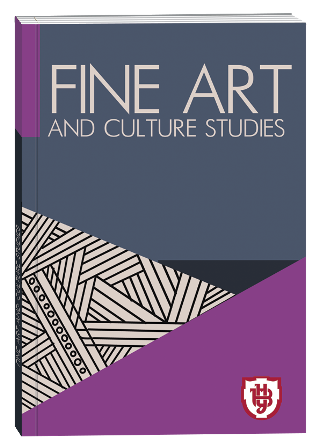НОВІТНІЙ ФОЛЬКЛОР ЯК ФОРМА ПОПУЛЯРНОЇ КУЛЬТУРИ В СУЧАСНИХ УКРАЇНСЬКИХ РЕАЛІЯХ: КУЛЬТУРОЛОГІЧНИЙ АНАЛІЗ
DOI:
https://doi.org/10.32782/facs-2025-1-49Ключові слова:
популярна культура, новітній фольклор, постфольклор, учасницька культура, механізми функціонування сучасної культури, національна ідентичність, форми культурного самовираження, культурна комунікаціяАнотація
Мета роботи полягає у комплексному культурологічному аналізі механізмів взаємодії популярної культури та новітнього фольклору в сучасних українських реаліях, виявленні особливостей їх трансформації та взаємовпливу. Методологія Продуктивним для досягнення пошукової мети є компаративний метод, який дозволив зіставити культурологічні характеристики популярної культури і новітнього фольклору, віднаходити в них точки збігу та змістові узагальнення. Використано структурний метод для аналізу новітнього фольклору як динамічної системи, конститутивними категоріями якої є: суб’єктність його авторів, нове смислотворення, колективний характер творчості. За допомогою узагальнення зафіксовано загальні ознаки та властивості популярної культури та здійснено перехід від одиничного та особливого (новітній фольклор) до загального (популярна культура). Наукова новизна полягає у виявленні і систематизації нових форм культурної творчості, розширенні методологічного інструментарію, що сприятиме глибшому розумінню процесів творення та трансформації культурних феноменів у сучасних українських реаліях. Висновки. Проведений аналіз теоретико-методологічної бази дозволив окреслити основні підходи до вивчення взаємодії популярної культури та новітнього фольклору. Уточнення понятійно-категоріального апарату сприяло розмежуванню суміжних термінів і визначенню новітнього фольклору як важливої складової популярної культури, що функціонує на перетині традиційних та цифрових форм комунікації. Актуалізація поняття новітнього фольклору в культурологічному аспекті дозволила розглянути його не лише як віддзеркалення соціокультурних змін, а й як активний механізм творення смислів у суспільстві. Окрему увагу приділено ролі цифровізації та соціальних мереж у формуванні постфольклору. Доведено, що цифрові платформи є не лише середовищем для поширення фольклорних форм, а й чинником, що трансформує власне принципи їхньої генерації, циркуляції та рецепції. Також було визначено ключових акторів, які беруть участь у творенні цих феноменів: медійні споживачі, онлайн-спільноти, професійні творці контенту (блогери, медійники). Виявлено механізми їхньої взаємодії, що дозволяють визначати сучасний фольклор як поле колективного творення, де аудиторія є не лише реципієнтом, а й активним учасником культурного процесу.
Посилання
Bourdieu P. Le Sens Pratique. Collection Le sens commun, 1980. 480 р.
Fiske J. Reading the Popular. Routledge is an imprint of the Taylor & Francis Group London and New York e-Library, 2005. 256 р.
Storey J. Inventing popular culture: from folklore to globalization. Вy Blackwell Publishing Ltd, 2003. 289 р.
Voshchenko V. Постфольклор як соціокультурний феномен мережевого суспільства. Філософські обрії. (47). 2023. С. 61–68. DOI:10.33989/2075-1443.2023.47.282558 (дата звернення 02.02.2025)
Барт Р. Від твору до тексту / переклад Юрія Ґудзя. Антологія світової літературно-критичної думки ХХ ст. Львів : Літопис,1996. 633 с.
Голубієвська Д. О. Фольклор міської вулиці: теоретико-методологічні пошуки. Літературознавство. Фольклористика. Культурологія: збірник наукових праць (№ 32). 2019. С. 162–172.
Грищенко І.В. Фольклоризація сучасної міжетнічної комунікації. Nowoczesna edukacja: filozofia, innowasja, doswiadczenie. Nr. 4. Łodź: Wydawnitctwo Naukowe Wyźszej Szkoły Informatyki I Umiejętności. 2015. S. 83–87.
Денисюк Ж. З. Постфольклор у парадигмі постмодерну: до постановки проблеми. Культура і сучасність. 2017. № 1. С. 3–8. URL: http://nbuv.gov.ua/UJRN/Kis_2017_1_3 (дата звернення 29.01.2025)
Коваль-Фучило І. Листи щастя ХХІ століття. Міфологія і Фольклор. 2010. № 3–4 (7). С. 72–79.
Кравченко О., Фєдотова Н. Мовна гра в інтернетних постфольклорних текстах періоду російсько-української війни. Лінгвістика. Збірник наукових праць. 2022. №2 (46). С. 60–71. DOI: 10.12958/2227-2631-2022-2-46-60-70 (дата звернення 01.02.2025)
Кузьменко О. Воєнний фольклор українців. Локальна історія. Веб-сайт: URL: https://localhistory.org.ua/videos/bez-bromu/ukrayinskii-voiennii-folklor-iak-zrozumiti-sebe-i-svogo-voroga-oksana-kuzmenko/ (дата звернення 29.01.2025)
Лисюк Н. А. Постфольклор в Україні. Київ : Агентство «Україна», 2012. 348 с.
Мельник Н. Сучасні народні твори про москалів: між фольклорною та постфольклорною свідомістю. Літератури світу: поетика, ментальність і духовність. 2021. № 15. С. 119–132.
Поліщук О. Б. Замовляння в українському мистецтві часів геноцидної війни Росії проти України. Мова. Література. Фольклор. 2022. № 1. С. 101–108.
Ромадикіна В. С. Метатекст культури в контексті художньої свідомості: аксіологічний аспект проблеми. Таврійські студії. Культурологія. 2012. № 2. URL: http://nbuv.gov.ua/UJRN/tsk_2012_2_9 (дата звернення 21.01.2025)
Руснак І. Є. Український фольклор. 2-ге видання, стереотипне. Київ : Академія, 2012. 304 с.







